Maple mead, also called acerglyn, is made by replacing some of the honey with pure maple syrup. Here is a delicious one gallon maple mead recipe fermented with orange and spices!
Simple Mead Making Ebook
Want to learn more about making mead? I have a Simple Mead Making for Beginners eBook just for you!
It has ingredient and equipment checklists and detailed instructions for brewing and bottling your mead, so be sure to check that out if you’re new to the mead making process!
What is Acerglyn (Maple Mead)?
Traditional mead is made with honey as the sweetener, but I’ve always wondered about using maple syrup instead.
As it turns out, this is actually a thing that people do, and the technical term for “maple mead” is acerglyn (just as a mead made with fruit is called a melomel).
For it to be mead some amount of honey still needs to be used, then the rest is pure maple syrup.
Maple mead is something that I’ve been curious about making for a long time, and now I’ve finally got a one gallon batch bubbling away!
I used a very similar method to my basic mead recipe (melomel) that I make variations of quite often. Head on over to that post to get more photos and details on the basic mead making process!
How to Make Maple Mead
The first step when brewing a gallon of mead is to make sure that you have all the right equipment.
A one gallon jug with an airlock is needed, as well as some kind of sanitizer (I like One Step brand).
You will also need to get brewing yeast, I generally like to use champagne yeast as it always works well for me and produces a dry end product, which I like.
But, there are many different yeast options out there to choose from. If you want a sweeter end product choose a sweet wine yeast.
See all of my mead making equipment and ingredient recommendations here.
Sanitize Everything
The first thing that you always want to do before any type of homebrewing is to make sure to sanitize all of your kitchen tools and equipment that will be used in the process, including the one gallon jug.
Make the Maple Mead Must
Once you’ve done that, put about ½ gallon (8 cups) of non-chlorinated water, along with the cinnamon stick and cloves, in a large pot and warm up on medium heat.
Then add the maple syrup and honey. Do not boil.
Turn off the heat once the maple syrup and honey have dissolved in the water.
Then use a funnel to transfer this mixture, including the spices, into the gallon jug. Add the raisins and orange wedges to the jug.
Fill the jug with cold non-chlorinated water, leaving about 3 inches of head space at the top of the jug.
If you have the cap to the jug, put it on and give it a few shakes to mix everything together. If you don’t have the cap, try and improvise with something else.
Pitch the Yeast & Add the Airlock
The next step is to add the yeast, but you need to make sure that the temperature of the mixture isn’t too hot first. It needs to be below 90°F, room temperature is best.
Use a thermometer to check the temperature of the must, and wait to add the yeast if it’s too hot.
Once the temperature is good, add about 1/2 package of champagne yeast to the jug. You can save the other half in the fridge for the next gallon batch of mead that you make.
Once again, put the cap on the jug if you have it, or improvise with something else, and give it a few shakes to distribute the yeast.
Fill the airlock with water to the line, then put the stopper end into the top of your jug.
Let the Maple Mead Ferment
Put the jug in a dark and quiet corner somewhere out of the way. It should start bubbling within a few hours, or overnight.
I woke up the next morning to a nice and bubbly jug, and the airlock was releasing carbon dioxide as well.
Check out a short video of the maple mead bubbles in action over on my Instagram page.
Let the maple mead ferment for about six weeks, or until there are no more bubbles. This may take more or less time, depending on the ambient temperature.
Bottling & Aging
When the acerglyn has finished fermenting you can bottle it in the same manner that I bottle my hard cider.
Once it’s bottled it will need to age for a bit before drinking so that it’s not so harsh.
Most of my mead recipes are usually quite good even when “green” (not aged very long), but the maple flavor definitely benefits from some aging.
I aged mine for about six months before trying it. It cleared up nicely and tastes amazing!
Because I used champagne yeast it is quite dry, but in a good way. Keep that in mind if you’d rather have a sweeter maple mead as you may want to choose another type of yeast.
More Mead Recipes
Ready to start brewing your next batch of mead? Here are 15 mead recipes for you to try including:
Maple Mead with Orange and Spices
Equipment
Ingredients
- 12-14 cups non-chlorinated water
- 1 cinnamon stick
- 4 whole cloves
- 3 cups pure maple syrup (24 oz)
- 1 cup honey
- 10 raisins
- 1/2 orange cut into wedges
- 1/2 package champagne yeast
Instructions
- Sanitize all kitchen tools and equipment, including the one-gallon jug.
- Combine 8 cups of water with the cinnamon stick and cloves in a large pot. Heat over medium and bring to a simmer. Do not boil.
- Once the water is warm, add the maple syrup and honey, stir until dissolved, then turn off the heat.
- Pour the water into a one-gallon jug using a funnel. Add the raisins and orange. Place the cap on the jug and shake several times to mix. Set the jug aside and allow the water to cool to room temperature.
- Add the yeast to the jug once the liquid cools to room temperature, or at a minimum, below 90°F. Place the cap on the jug and shake to distribute the yeast.
- Fill the airlock with water to the line, then place the stopper end into the top of the jug.
- Place the jug in a dark corner. It will begin to bubble overnight. Ferment for approximately six weeks, or until there are no more bubbles. Then bottle using this method. After bottling, age to preference.
Notes
- Feel free to adjust the spices to your personal preference.
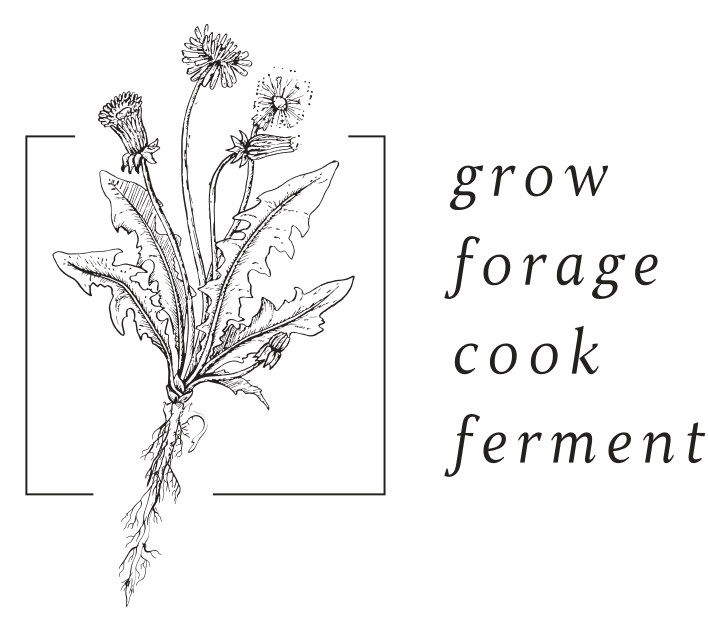

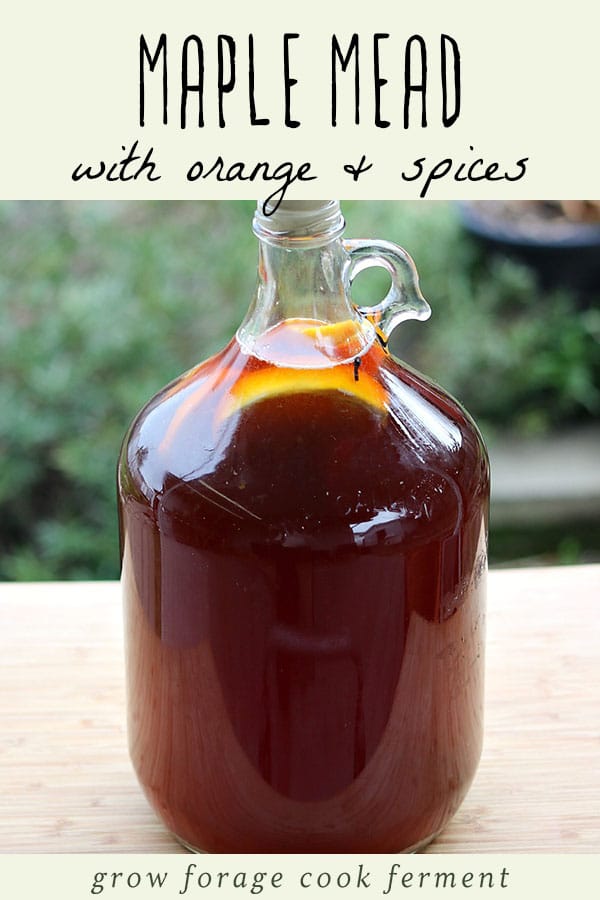


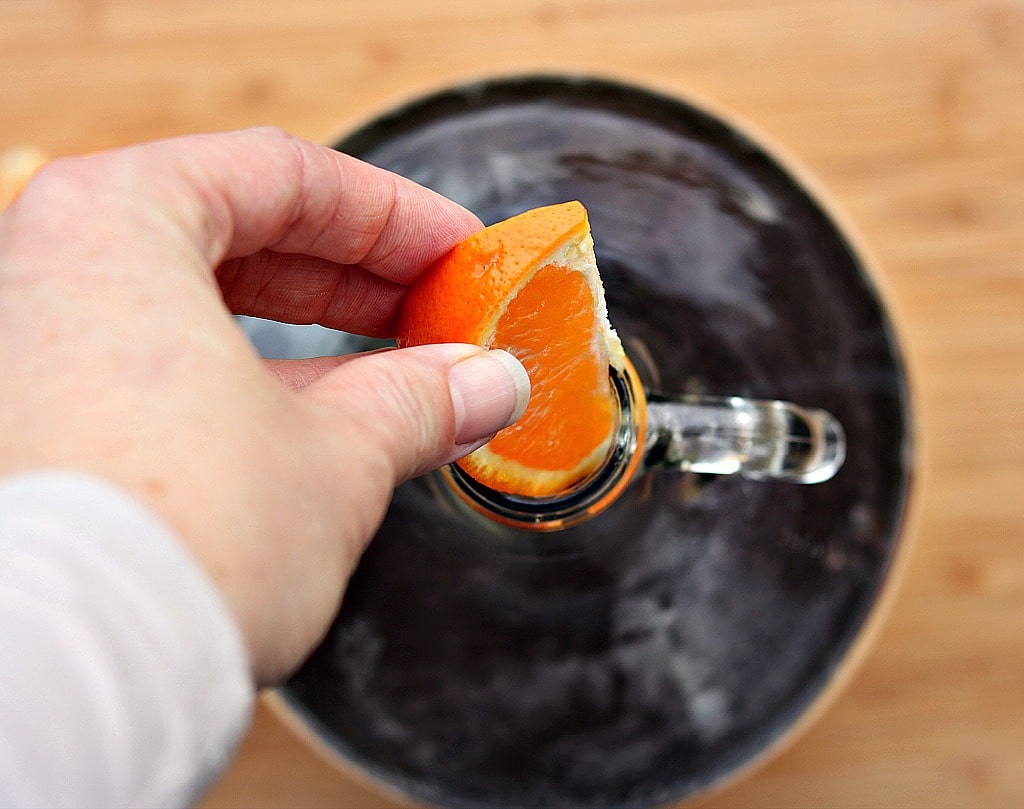
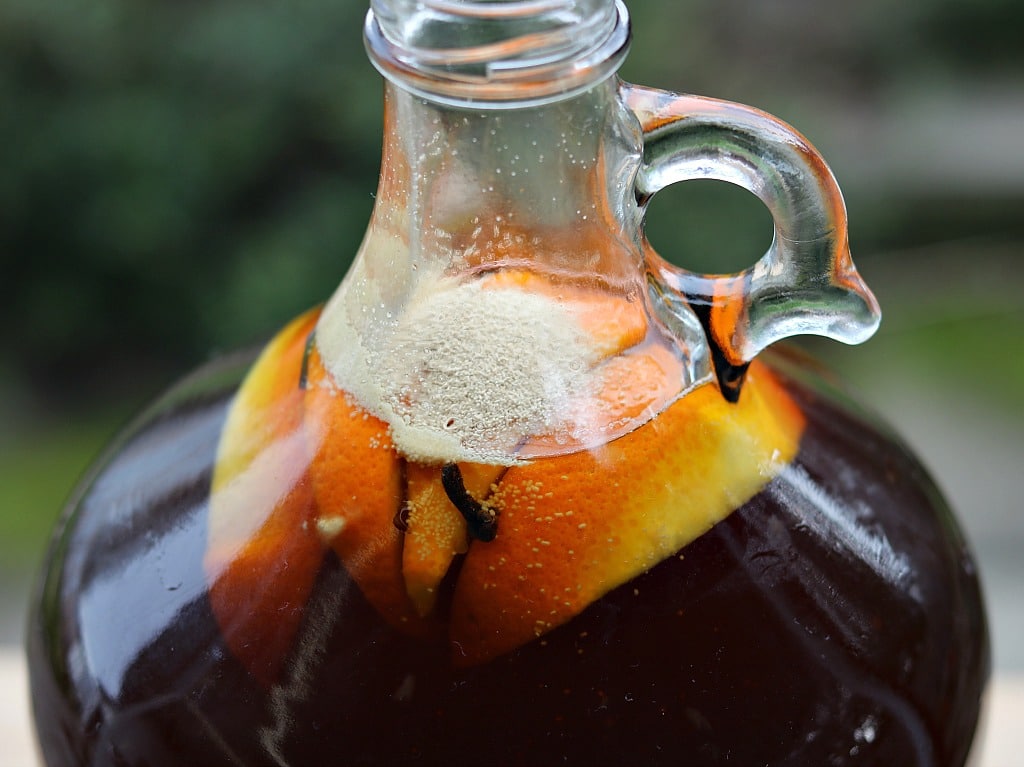
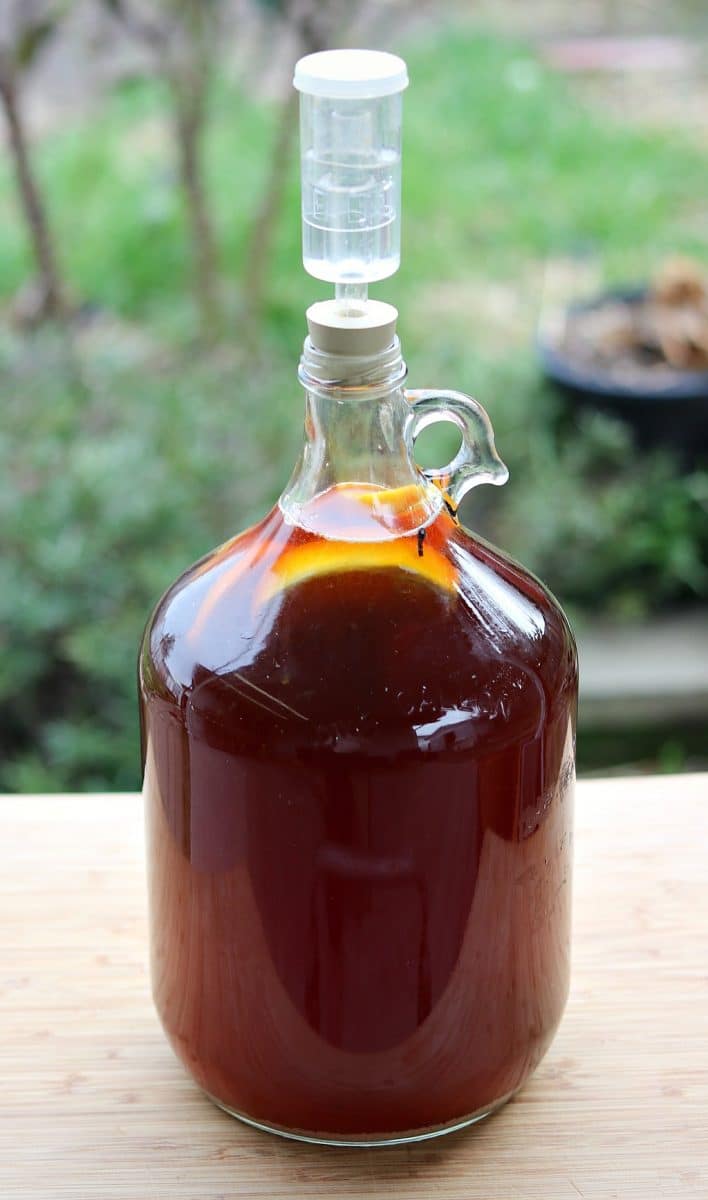
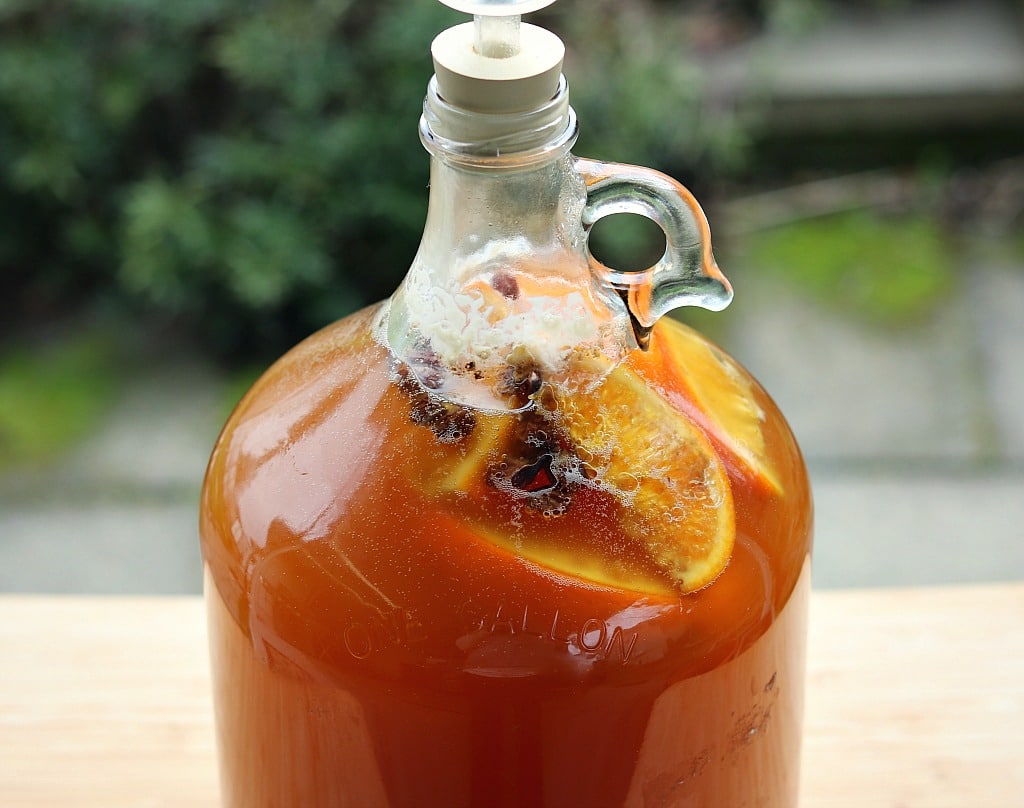



Great recipe, thank you! But I am trying to wrap my head around something. How do you avoid it going into vinegar once it is finished fermenting? Does it just “stop” at mead automatically without going vinegary? Many thanks!
We are responsible for 72% of the worlds Maple syrup production so we can get a tad whiny on our syrup in Quebec, Sorry.
Some American grades are fine, heck even great, its just some grades you guys have are illegal to sell here unless you drop the “maple” out of the name because its not pure enough to be labelled that. in Quebec we all grew up surrounded by a third of the worlds supply flooding our stores and as kids we all go to sugar shack, put the stuff all over breakfast, the real 100% stuff not Jemima’s since the real stuff is cheap here and most people I know including myself made it as kids by tapping trees near our schools as projects or when visiting cabane à sucre, even doing it in our own backyards since most of us have maple trees. growing up on 100% means if you give us trash, we taste it right away.
I know there are great Syrups south of the border but since its legal to write “Maple” on Vermont Maid wich is only 2% maple, Aunt Jemima, and other low grade trash down there, wich we sometimes mistakenly decide to try out when we see it on sale at Walmart,
many Quebecois associate you guys with fake junk. We call that stuff “Sirop de Poteau” translating into “Post syrup”, due to a fact it taste as if you tapped a telephone pole instead of a maple tree.
That being said, your top shelf stuff is great, its the rest of your stuff that gives you a bad name. When we produce stuff that isn’t good, we write “100% pure Canadian maple” and export it to you guys. Your bogus laws say we can get away with selling it to you with that written on it even if its only got 2% maple.
Boy am I glad I married a Canadian girl because I never have to suffer with Putting pole syrup on our pancakes or crepes! We reside in New Hampshire and cringe at the people who cannot even pronounce poutine correctly! i cannot wait til this mead is ready so I can enjoy it with a slice of tart au sucre!
When you brew something that goes over ~10% alcohol it’s very hard to turn it into vinegar (and this is over 16%). You still want to avoid adding oxygen, so rack and bottle properly and don’t store with much head room, but this should not be a problem at all with so much alcohol. Also, technically speaking, this is a maple wine not a mead. Mead needs to have 51% or more of honey, here it was only 25%.
syrup from Quebec… USA grade A… I knew Quebec disliked the rest of us but that’s taking it a bit far.
Can I leave the honey out and just go with the maple syrup? If so, how would the quantity of maple syrup change? Thanks for sharing the recipe; definitely going to try this.
You could but it wouldn’t be mead then. You need at least 50% of it to be honey. You will want to test it with a smaller amount of water to see how much gravity the syrup adds into the water.
I will be doing this recipe today, but on a larger scale. I have a 6.5 gallon carboy. I make all kinds of wine.
When you bottled yours for the secondary fermentation where did you store them?
Also within the 6 week primary fermentation phase before you bottled, did you stir it at all or did you just leave it?
I did not stir it during fermentation, and I store my bottles in a cool pantry or in the garage!
I currently have a batch of mead brewing and I just have one slice of orange in it. The peel is exposed to air a bit and is darkening. Is this pretty normal part of its ferment in alcohol? Everything looks and smells okay otherwise as far as I can tell. Thanks!
Thank you for this recipe. I have already started a batch before I found your site. I have 1/2 gallon of NYS light amber 1/2 gallon of NYS dark amber and 2 quarts of wildflower honey in primary now. Initial SG was 1.112 and at last check it was down to I believe 1.024 putting it in the 12% range. Should be slowing down soon as I used a wyest sweet mead yeast that is rated 11-13%.
What did you find for final aging that worked best for the taste? So meany people want to try it but I don’t want to hand out immature flavors to them.
Thanks!
Any updates on how the mead is aging? I have some peach wine and rosehip wine taking up my primary fermentors, and I am going to try this next. I think I will try 1/2 honey and 1/2 maple syrup.
Just made a 4 gallon batch with Maple syrup..honey..juniper berries raisens, red raspberries..it’s been a week and all is excellent..taste wicked good now..hoping the ABV will be a bit higher in the long run..will sit racking up..for immediate.short..and long term fermentation..starting a traditional mead using fresh moss..old Irish/Norse recipe..anyone ever tried this??
I’m brewing my second batch of this today. Two questions: 1) my first batch was very dry, was very orangy and had no residual maple. I drank it and liked it but I was expecting sweet and maple. Anyone else with that experience?
2) has anyone tried carbonation? Sparkling mead with this recipe ? Any tips?
I’ve also heard that the maple flavor will disappear, and some are left with a bourbon essence on the tongue. Trying to make my first batch this weekend.
I would like to try making this mead , but I thought I would check to see how it came out. So how did it turn out?
Kinda wondering the same!? Just finished boiling down the rest of my sap and wanna try it. But I don’t want to ruin awesome syrup. Anybody wanna update this and let everyone know their thoughts
I will be making a 5-gallon batch of Orange-Sorghum mead next, but this 1-gallon Acerglyn will be my next experimental batch. I’m thinking that I will use my homemade orange extract instead of whole oranges though as I’ve found that the orange flavor is usually stronger with the extract.
Hey maker of the recipe how does your mead taste now? Curious minds want to know
I think it tastes great! I still have a few bottles aging and will update this post once I taste the results of those.
Curious how did this turn out?
I think it’s great so far! I tried some “green” and have left some to age a bit. I will update the post once I get the final results!
I made this and it tastes terrible! I have put it in bottles and am hoping it improves with age.
Really? I think it tastes great! It should improve quite a bit with aging, though :)
Just thought of this, but how do you get all the fruit out? especially the oranges? I started making this recipe about a month ago and I have no idea how easy the fruit will come out.
How long to age them once you bottle it?
I would back off the cloves, I made a double batch and they were overpowering, so now making a 3rd single batch without any cloves to mix with the original double batch. While the original 2 age, this will ferment for about 3 weeks before I mix it with the other.
It was still pretty good but the cloves like I said were just too much, so I’d back off to 1-2. (unless my cloves were mutant strong, most recommendations are 1-2 per 5 gallon batch and this is only 1 gallon)
I love it with the clove flavor! But, I’m also one for strong flavors like that :)
I think the amount of cloves, cinnamon, allspice, vanilla, etc. depends on each individual’s taste. I always tell people to start with less and add more to the next batch if they desire, but personally I like adding 2-4 cloves per gallon because I enjoy the taste of a strongly spiced mead. Still haven’t made a mead with maple yet but I’m thinking of starting one today!
Could you now turn around and do a cold distillation on this and get spiced honeyjack
I just put this on today. Bottling May 2, 2017. This is my first attempt at a mead. I am so excited!!!
Fantastic!
I happen to have a quart of locally-made maple syrup that has been hanging out in my cabinet for months. I came came across this recipe randomly and I’m so excited to try it! I’ve never made mead before and in reading other recipes, almost every one has a second fermentation (after the initial 6 weeks, they say to transfer to another container and let ferment for up to 6 months), then it is bottled. Why do you do only one fermentation? Also, is the orange absolutely necessary? That is the only ingredient I don’t have and I don’t want to have to wait until I go to the store to try making this!
Awesome! I like to keep my mead recipes very simple, so the second ferment actually happens in the bottle. Feel free to do a separate second ferment if you’d like, though! I find it to be unnecessary for simple home brewing, though. The maple mead will be just fine without the orange :)
Just put up a batch. No oranges thou. Is that ok?
That should be just fine :)
Bubbling stopped about a week ago. Transferred (secondary) into another vessel tonight. Pretty cloudy and has a strong fermented taste. Yuk! Should I continue??
Yes, for sure! It will likely mellow out with age :)
I gave this recipe a go. The initial ferment was very strong so I added more honey and water before bottling and let it sit for a few weeks before I gave it another go. The flavors developed and the finish mellowed significantly.
Man, I can’t wait to do this. I try various fruit wines between grape harvests. Some are good, some not so good :)
Thanks again.
Just finished it. Roll on 6 weeks. Nice one Colleen,
I like to make my mead with wild yeast, which I learned about in Sandor Katz’s book. Your Maple Orange brew sounds delicious. I’m thinking I’d add the syrup after I catch the yeast. And then put it under airlock. What do you think?
If you use raw honey and don’t heat it above boiling, it should work fine. For an extra assurance, you can always start it in a pot covered in cheesecloth (to capture wild yeast) and set it outside for a few days, then transfer to a gallon container with an airlock to finish out fermentation. Sounds like that was your plan anyway, though! Yay for wild! Just be patient with it and know it may take longer to age out, and will definitely go through some funky flavor profiles in the meantime.
I will be giving this a go for sure. I don’t have a small jug so will be using my carboy instead for a relatively large batch.
Better to get a small jug. That much headspace is bad for your batch, I’ve found. Hey, scale it up to a five gallon batch! ;-)
Need lots of maple syrup for that, Fortunately Costco sells Extra Dark Amber Strong Flavor (the new designation for the old “Grade B,” the stuff native Vermonters keep for themselves<) for about $11 a liter.
I've made a straight maple mead, spiced with a spice combination out of a 14th century French mead recipe. it's pretty good stuff. Especially if you infuse a few hot chilis into it for a day or so.
Hi would you be willing to share your recipe here?
So I made the 5gal batch with orange and spices. I’m afraid there won’t be any second firms ration. My family drank it all while it was still green! Haha guess it’s good stuff. :)
I did find it easier to crack the spices then place them in tea bags before adding. This way it was really easy to remove them with no worry of clogging our siphon hose.
I will be trying your recipe in a day or two! Thanks!!